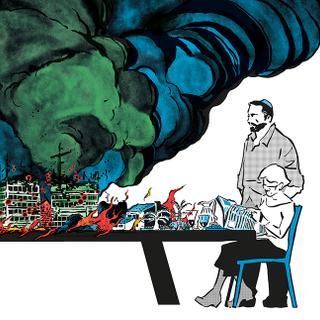


Jewish families face divisions over Israel-Hamas war
InvestigationThe conflict has made its way into French Jewish homes, revealing antagonistic points of view regarding Israel, even if the picture seems more nuanced than in the US.
The day after October 7, 2023, the day of the Hamas attack on Israel, Elie was out shopping in Paris with his mother when unease crept into their discussion. As they talked about the massacre, the 26-year-old engineer (who wished to remain anonymous) said what he felt: He didn't feel emotionally involved in events taking place 5,000 kilometers from Paris, in the Middle East. He was saddened by the death of 1,200 innocent victims, of course, but no more or less than if the attack had taken place in some other faraway land.
"My mother was outraged, scandalized," he said in a café in the center of the French capital, wearing a turtleneck and sporting stubble. "She couldn't hear what I, as a Jew, was saying. I was surely feeling anger and sadness." He saw things differently and explained that he feared the hateful and angry engagement that this terrorist attack would bring, with its accompanying community tensions around the world: "I immediately thought of the repercussions for the Arab-Muslim community in France," said the young man.
In the days that followed, the tension continued unabated. Elie, who supports France's Green Party, saw Israel's retaliation as a "disproportionate response," while his family (Ashkenazi, some of whom live in Israel) supported Israel's right to defend itself. "It is not possible to use history to justify violence," he said, when his relatives invoked the memory of the Holocaust, spoke of Israel as the refuge state for all the world's persecuted Jews and reproached him for his naivety and utopianism.
'A new catastrophe is just around the corner'
Elie had noticed that family dinners were becoming increasingly rowdy. After the outbursts, there was awkwardness, then demands for apologies. Then he decided to stop broaching the subject. "I realized that, for the rest of my family, October 7 represented a continuation of the anti-Semitism that never goes away, with the idea that a new catastrophe is just around the corner," he said.
Elie's case is far from unique. While many French Jewish families have closed ranks in the face of the violence of the October 7 attack, in others, the event has heightened existing tensions between generations, or even brought new ones to the surface. For most French Jews, the Israel-Hamas war is not an abstract subject: It conjures up painful memories of the past and concerns for the future. It also raises the question of what it means to be Jewish in France.
"Crises like those of October 7 are moments of a strong call that can produce an awakening of identity among French Jews," said Sylvie Anne Goldberg, a historian specializing in Jewish history, who edited the 2023 collective work Histoire juive de la France ("A Jewish History of France"). "A similar phenomenon occurred at the time of the June 1967 war [known as the Six-Day War], when French people, sometimes even detached from any connection with Jewishness, felt part of Israel's future." This time, the attacks and the war are even being debated within families.
You have 80% of this article left to read. The rest is for subscribers only.
